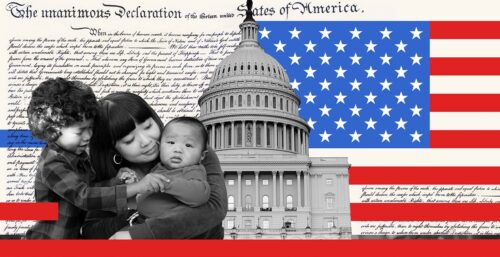Summary of the Comprehensive Immigration Reform for America’s Security and Prosperity Act (CIR ASAP) of 2009.
Title I. Border Security, Detention and Enforcement
Border Security: The bill contains provisions which seek to enhance border security and achieve effective immigration enforcement, including:
- Requires the Secretary of Homeland Security to formalize a national strategy for border security consistent with the progress already made by the Department of Homeland Security and aligned with a vision of effective and accountable enforcement for the 21st century.
- Creates a Southern Border Security Task Force composed of federal, state, and local law enforcement officers to protect United States border cities and communities from violence and crime along the U.S.-Mexico border.
- Requires the government to take an inventory of personnel and assets prior to increasing the number of personnel or assets.
- Supports additional training, oversight and evaluation for border agents and works to ensure that they have sufficient equipment and technology.
- Modernizes the ports of entry by requiring a study of port of entry infrastructure and operations to identify necessary improvements and projects and improving infrastructure resources, and training to allow for more effective screening of commercial goods and individuals as they cross our borders so as to minimize threats to national security at ports of entry.
- Increases the numbers of full-time port of entry inspectors, agricultural specialists, and support staff to improve the timely and safe flow of commercial goods and individuals.
- Improves collaboration with state law enforcement at the border in combating crime.
- Suspends the Operation Streamline program pending review of the goals, impacts and cost-benefit analyses.
- Recognizes the importance of border communities as partners and allies in achieving effective enforcement and establishes the U.S.-Mexico Border Enforcement Commission and the Border Communities Liaison Office.
- Includes measures to combat human smuggling and migrant deaths including requiring the development and implementation of a plan to improve coordination amongst federal and state partners to combat human smuggling.
Improving Conditions of Detention: The bill contains numerous provisions which seek to improve detention conditions, and to protect U.S. citizens, LPRs, and vulnerable populations including:
- Requires DHS to meet certain requirements to ensure humane treatment of detainees, ensures adequate medical treatment, requires access to telephones, and increases protections from sexual and other abuse.
- Establishes an independent immigration detention commission to investigate and report on compliance.
- Requires DHS to report any detainee death within 48 hours, and to report annually to Congress on circumstances of all deaths in detention.
- Improves secure alternative to detention programs.
- Prohibits unnecessary detention of refugees.
- Protects family unity by prohibiting the separation of families with children and increasing protections for detained parents, guardians, and caregivers.
Increasing protections during enforcement activities: The bill contains several provisions which seek to ensure due process and other protections during enforcement activities:
- Provides temporary visas and work authorization for detained workers when they have been targeted by their employer for asserting their rights if they agree to pursue labor claims against their employer. Expands U visa protections for whistleblowers.
- Repeals the 287(g) program and clarifies that only the federal government has the authority to enforce federal immigration law.
- Increases screening and protections during immigration-related enforcement activities for U.S. citizens, LPRs, others lawfully present in the U.S., and vulnerable populations.
- Ensures social service agencies, translators, and legal services are available during enforcement activities, and establishes access to legal orientation programs for all detained immigrants.
- Protects access to counsel during enforcement activities and for disabled individuals unable to fully participate in removal proceedings.
- Requires reports to Congress from DHS on the impact of immigration-related enforcement activities.
- Restores the federal courts of their jurisdiction to review the decisions and practices of DHS.
Title II. Employment Verification
Verifying employment authorization: The bill creates an employment verification system for employers to verify the work authorization of new hires. The new system is to be rolled out in phases, and will eventually apply to all employers and all new hires. The employment verification system:
- Creates significant civil penalties for employers who do not comply with the requirements under the new system and establishes serious criminal penalties for knowingly hiring unauthorized workers.
- Includes privacy protections, and prohibits the creation of a national ID card.
- Includes anti-discrimination provisions and forbids employers from using the new system to discriminate against applicants or employees on the basis of nationality. Prohibits employers from terminating employment due to a tentative non-confirmation, using the system to screen employees prior to offering employment, or using the system selectively.
- Allows an individual to register with the Social Security Administration and acquire a PIN that would allow them electronic access to their file in the system, update their information, and lock their file for purposes of employment.
Title III. Visa Reforms
Family and employment backlog reduction: The bill contains several measures designed to reduce long backlogs in family and employment immigrant and nonimmigrant visa processing:
- Permits the “recapture” of unused employment-based visas and family-sponsored visas from fiscal years 1992-2008 and allows future unused visa numbers to roll over to next fiscal year.
- Exempts immediate relatives from the annual cap on the number of immigrant visas, and increases the number of visas which may be issued per country per year.
- Permits qualified workers eligible for an employment based petition to receive work authorization until a visa becomes available.
- Exempts from skilled worker numerical cap U.S. educated foreign nationals who receive science, technology, engineering and math degrees and other critical workforce graduates.
- Exempts foreign nurses from current numerical limitations and provides new programs to fund and develop domestic nursing supply and encourage training of other domestic health care professionals.
Promotion of Family Unity: The bill includes various measures designed to keep U.S. families together:
- Reclassifies spouses and children of lawful permanent residents as immediate relatives.
- Ensures that immediate relatives may continue to pursue their immigration petitions even if the U.S. citizen or LPR who petitioned for them dies.
- Provides the government with greater discretionary authority to waive unlawful presence and other bars in order to reunite families.
- Provides relief for orphans and widows of U.S. citizens and legal immigrants by allowing them to retain eligibility for waivers and other considerations that would have been available to them at the time of the petitioner’s death.
- Permits immigration judges greater discretion in determining eligibility requirements for long-term lawful permanent residents seeking cancellation of removal.
- Includes protections for refugees, parolees or asylees by prohibiting the removal of any individual who fled his or her homeland for fear of persecution before the age of twelve and was subsequently admitted into the United States as a parolee or refugee or was granted asylum in the United States.
- Permits an immigration judge to decline to order the removal of the parent of a U.S. citizen child if the judge determines that removal would not be in the child’s best interests.
- Revises the eligibility requirements for sponsorship of immigrants by reducing the level of support required from 125% of poverty level to 100% of poverty level.
Preventing future illegal immigration: The bill creates the Prevent Unauthorized Migration Visa (PUM Visa) that seeks to provide for safe, humanitarian migration during the three-year transition period before the enactment of recommendations made by the new Labor Commission.
- Creates 100,000 PUM visas annually, for 3 years, to persons from those countries which represent at least 5% of the total unauthorized migration population within the United States for the past five years and will be distributed on a percentage basis through a lottery system.
- Individuals may apply to the lottery if they are not present in the United States at time of filing, do not have other family or employment based means to immigrate, submit to criminal background checks, and have completed less than a 4 year college degree program.
- Individuals awarded visas will be admitted to the United States as conditional residents and may petition for LPR status after 3 years.
Title IV. Legalizing Undocumented Immigrants
Legalization: The bill creates a legalization program for qualified undocumented immigrants (and their spouses and children):
- Those who qualify would receive a conditional nonimmigrant visa which is valid for six years. This visa allows legalized immigrants with work and travel authorization and protection from removal.
- To qualify, an applicant must:
- Establish they have been in the U.S. illegally before December 15, 2009.
- Attest to having made contributions to the U.S. through employment, education, military service, or other volunteer/community service (with exemptions for minors, persons with disabilities, the elderly, or other unusual circumstances).
- Pay an application fee and a $500 fine.
- Not have any convictions for a felony or for three or more misdemeanors.
- Certain immigrants who are in removal proceedings, facing removal, or ordered to depart voluntarily would be able to apply for legalization.
- All bars related to undocumented status – such as using a false Social Security number — will be waived (but security and criminal bars cannot be waived).
Adjustment of Status to LPR: Qualified conditional nonimmigrants and their spouses and children will be able to apply for lawful permanent resident status (green card) and eventual citizenship. The bill:
- Assures that no green cards may be issued under this program earlier than six years after the date of enactment unless existing immigrant backlogs have been cleared before that time.
- Provides that immigrants who adjust from a conditional nonimmigrant visa (including dependents) to lawful permanent resident status shall not be counted against the worldwide numerical visa caps.
DREAM Act: Undocumented individuals who were brought to the U.S. before the age of 16 will apply for legal status through the same program outlined above.
- Eligible persons will not have to pay fines.
- Such persons will be eligible for accelerated LPR status upon graduation from high school, and completion of two years of college, military service, or employment. Persons granted LPR status under this provision will be eligible for naturalization three years after the date LPR status is granted.
- Individual states will be permitted to determine whether undocumented students can benefit from in-state tuition rates.
Farmworkers: The AgJOBS Act of 2009 is included in the CIR ASAP Act, which allows unauthorized farmworkers to legalize their status and reforms the H2-A temporary agricultural worker visa program.
Title V. Strengthening America’s Workforce
Commission on Immigration and Labor Markets: The bill creates an independent federal Commission on Immigration and Labor Markets that:
- Will develop employment based-immigration policies for the promotion of economic growth, competitiveness, and wage and labor protections.
- Will create a federal research agenda on the economic impact of immigration, analyze and publish employment related immigration data, and make recommendation to Congress for setting new levels of employment based migration as well as the numerical levels and characteristics of procedures for future flows of workers to be admitted into the United States.
Security and Prosperity Account: Many of the fees and fines generated by new programs within this bill will be deposited in a new Security and Prosperity Account.
- Funds in this account will be used to assist state based worker training programs, fund the Electronic Employment Verification System, fund the Commission on Immigration and Labor Markets, create additional funding programs to assist and train American workers, fund border security, detention and enforcement activities and reduce visa backlogs.
American Worker Recruit and Match System: Establishes the American Worker Recruit and Match System (AWRMS), a searchable database tied into state workforce agency networks that allows employers to post job opportunities in fields that have traditionally relied on unauthorized labor. AWRMS will match employers with qualified individuals who post their profiles on the website.
Revisions to Temporary Worker Programs: The bill seeks to increases protections on foreign recruitment and makes other changes to existing temporary worker programs:
- Requires written notice of terms of employment to ensure that foreign recruiters do not mislead prospective employees. Requires employers to identify recruiters working on their behalf to Secretary of labor, to give notice of possible violations, and to be liable for recruitment violations.
- Expands requirements for recruiting American workers before hiring foreign nationals, increases authority for Department of Labor to investigate potential fraud and abuse, authorizes annual audits of employers who rely heavily on H-1B program and increases penalties for violations.
- Authorizes DHS to audit L-1 visa participants. Penalties will be assessed for violations of the provisions of the L-1 visa program.
H-2B visa program: The bill establishes stricter requirements for recruitment of American workers and prohibits participation of employers who have conducted a mass lay-off in the past year and increases worker protections.
EB-5 Investor Visas: The bill:
- Permanently reauthorizes the EB-5 visa program and expands it to make available 10,000 visas.
- Permits expedited processing for an additional $2500 fee.
- Expands current definition of Targeted Employment Area to include among other characteristics rural areas, areas of high unemployment, counties with 20 percent or more population decrease since 1970.
- Authorizes DHS to study and recommend new strategies for job creation. Creates a new venture capitalist visa.
Title VI. Integration of New Americans
Immigration Fees: Ensures that future fee increase requests receive closer scrutiny and makes citizenship more accessible and affordable.
Improving the Naturalization Process and Integration: Seeks to encourage citizenship among immigrant communities by:
- Providing for uniform administration of the naturalization exam.
- Promoting citizenship of the elderly by adjusting the age requirements for English language exemptions.
- Requiring timely response on background checks and evaluating their efficiency.
- Creating a grant program for community based organizations to promote and help immigrants prepare for citizenship.
- Creating incentives for English language acquisition programs.
- Celebrating the citizenship of new Americans and encouraging them to integrate into their communities.



